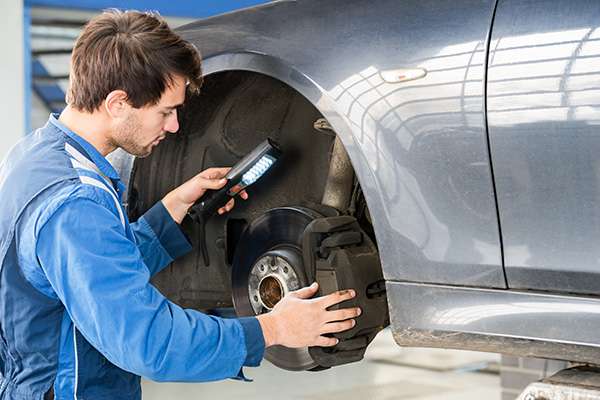
A smooth stop should be something you can count on every time you press the brake pedal. So when your steering wheel or brake pedal starts vibrating during braking, it's a sign that something’s not quite right. This isn’t a problem that should be ignored—it can point to underlying issues in your brake system or suspension, and the longer you wait to address it, the more damage it will cause.
What Brake Vibration Feels Like
You’ll usually notice the vibration either in the brake pedal, the steering wheel, or sometimes even throughout the entire car. It’s most obvious during medium to heavy braking, particularly at higher speeds. The sensation can range from a subtle pulse to a sharp wobble, making it hard to feel in control.
Most drivers first experience brake vibration during highway braking, like when exiting a freeway or slowing for a stoplight. If the vibration worsens over time, it’s a signal that your brake components are likely wearing unevenly or something’s out of alignment.
Warped Brake Rotors
One of the most common reasons for vibration during braking is warped brake rotors. Your rotors are the large, flat discs that your brake pads clamp onto when you stop. Over time, heat from repeated hard braking can cause the rotors to warp slightly or develop uneven wear. When this happens, the brake pads no longer make smooth contact with the rotor surface. Instead, they bounce slightly on each revolution, causing vibration.
Warped rotors aren’t always visible to the eye, but you’ll feel their effect every time you stop. A professional can measure rotor thickness and flatness to confirm the issue. If the warping is minor, resurfacing (or “turning”) the rotors may fix it. If it’s more severe or if the rotors are too thin, replacement is the better option.
Brake Pad Problems
Sometimes, the issue lies not with the rotors but with the brake pads. If the pads are worn unevenly, contaminated with oil or debris, or glazed due to overheating, they may not make consistent contact with the rotors. This uneven grip causes the same kind of pulsing or shaking sensation.
Low-quality pads or pads that haven’t been properly bedded in can also lead to problems. Using the right brake pad material for your vehicle and driving style makes a big difference in long-term performance and comfort.
Suspension or Steering Issues Can Amplify Vibration
Brake-related problems aren’t the only reason your car might vibrate during a stop. Worn or damaged suspension components, such as control arms, bushings, tie rods, or ball joints, can exacerbate the effects of minor rotor or pad issues. If your suspension isn’t holding the wheels steady during braking, the movement can translate into shaking and instability.
Likewise, problems with wheel alignment or tire balance can introduce vibration that feels worse under braking. These issues may also cause your car to pull to one side or make unusual noises, especially while cornering or driving at higher speeds.
Brake Caliper Issues and Sticking Components
Another possible cause of braking vibration is a sticking or malfunctioning brake caliper. Calipers apply pressure to the pads during braking. If one caliper is sticking or applying uneven pressure, it can cause one side of the vehicle to brake more aggressively than the other, leading to pulling, vibration, or even a burning smell in some cases.
This problem can sometimes be traced to corrosion, worn caliper hardware, or collapsed brake hoses. Left alone, it can damage the pads and rotors over time, significantly reducing your stopping power.
When to Schedule a Brake Inspection
Any vibration during braking is worth a closer look. Even if it’s subtle at first, the issue can progress quickly. A brake inspection can identify whether the problem lies with the rotors, pads, calipers, or suspension. It also gives you a chance to correct the problem before it affects your safety or results in more expensive repairs.
If you’ve noticed the vibration growing worse, or if it’s paired with other symptoms like squealing, grinding, or reduced braking power, don’t wait. Brakes are your car’s most important safety system and should always be performing at their best.
Expert Brake Service at Hometown Tire and Auto in Liberty, TX
If your car is shaking when you brake, it’s time to get a professional evaluation. At Hometown Tire and Auto in Liberty, TX, our technicians are trained to identify and fix all types of brake and suspension issues. We use high-quality parts and proven diagnostic methods to make sure your vehicle stops smoothly and safely every time.
Bring your car in for a brake inspection today and restore confidence in your vehicle’s stopping power with the help of Hometown Tire and Auto.